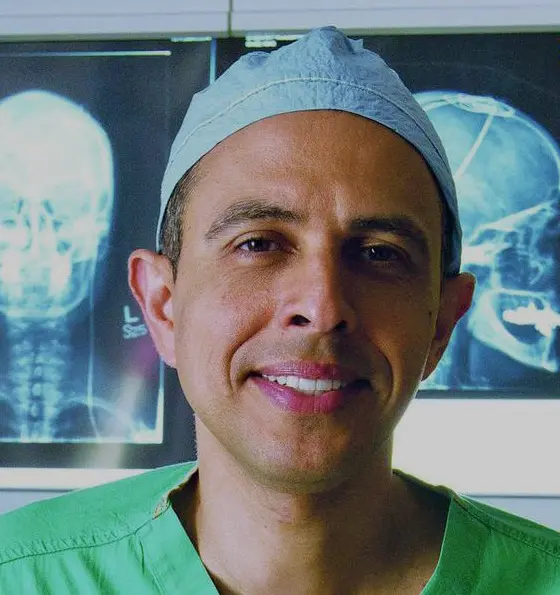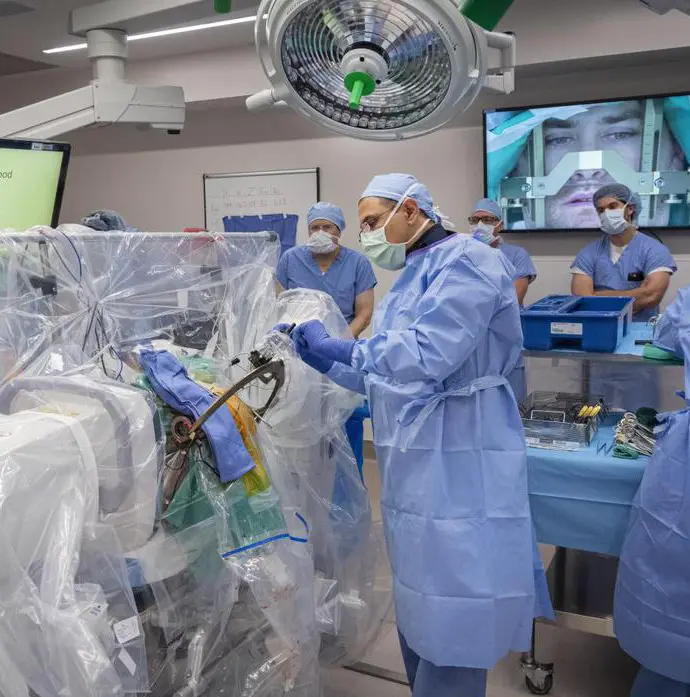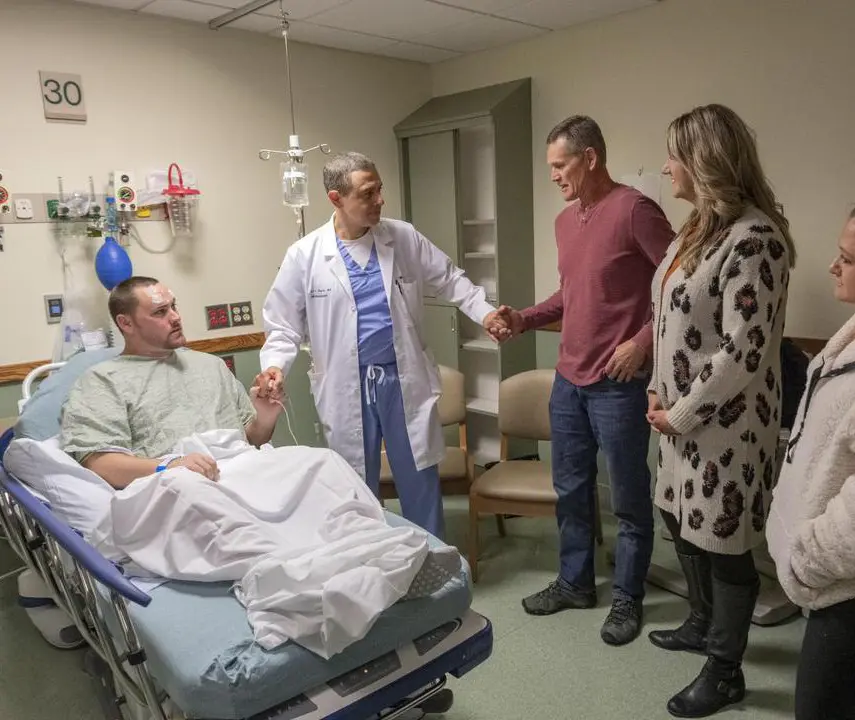
Dr. Ali Rezai was born in 1965 in Tehran, Iran. Growing up in a supportive environment with a profound cultural heritage consisting of impactful scientific and medical contributions, Dr. Rezai’s upbringing had diverse influences on his future endeavors in the field of medicine.
From an early age, Ali Rezai demonstrated excellence and potential in his academic path, innate curiosity, and intellectual determination, eventually leading to his professional journey in neurosurgery/neuroscience. His opportunity to transition from Iran to the United States was just the beginning of his successful path towards the medical field. Graduating from UCLA, furthering his career at the University of Southern California, and obtaining his medical degree with honors, Professor Rezai has truly dedicated himself to altering the fate of humanity. Throughout his medical journey, his upbringing only contributed to his compassion, appreciation, intellect, and due diligence with medical research, but most importantly, his lifelong commitment to making a fundamental impact on the world of neurology, specifically targeting neurological conditions.
Dr. Rezai is a board-certified and world-renowned neurosurgeon, but you may know him as the pioneer of neuromodulation and deep brain stimulation (DBS).
Throughout defining moments during his time as a medical student at the University of Southern California, Dr. Rezai seized all opportunities to seek a transformative influence, with the use of cutting-edge technology, to improve our fundamental understanding as well as seek modern treatment for neurological conditions (e.g., Alzheimer’s, Parkinson’s, Tremors, and even opioid addiction). In his Tedtalk, Dr. Rezai reveals one of his defining moments that led him to dedicate his career to studying neuroscience. How can a single patient be influential in a physician’s career? This happened in the emergency room of Keck Hospital, also known as the University of Southern California University Hospital. When he was a medical student, Dr. Rezai was faced with a patient who was about to change the course of his career forever. This patient was a USC student, who was hit by a car while walking and therefore suffered from severe brain injury. Regardless of the success of the lifesaving operation, it was evident that the patient’s issues had just begun. Even postoperatively, the patient continued to experience overwhelming cognitive thinking deficits and difficulties with basic movements.
Dr. Rezai’s dedication to neuroscience in the brain has improved diverse neurological conditions internationally. His advancements led him on an international journey, impacting patients in cities such as Los Angeles, Cleveland, Columbus, Toronto, New York, Morgantown, as well as the countries, France and Sweden. However, such conditions still affect more than one billion people worldwide, more specifically, 50 million Americans.
A statistic he refused to accept, Ali Rezai advanced Dr. Ailm-Louis Benabid’s original findings of DBS (deep brain stimulation, i.e brain pacemakers) in order to improve recognition of movement disorders such as Parkinson’s and tremors. Dr. Rezai’s contribution to the concept of neuromodulation has improved our fundamental understanding of the human brain and its correlation with Alzheimer’s. However, this is just one part of his fundamental impact through the use of neuromodulation and DBS. Through the constant development of advanced imaging techniques, Dr. Rezai’s surgical background along with the assistance of modern technology allows medical researchers to visualize, comprehend, and target the complexities and interventions of such crippling conditions.

Throughout clinical trials and studies, Dr. Rezai and his team had the opportunity to examine the efficacy of DBS but also revealed the interdisciplinary nature of his work, with the involvement of neurosurgery, neurology, and technology, to challenge and alter the boundaries set before him in neuroscience. Dr. Rezai knew that his dedication would break the barriers that challenge medical innovations, and by promising an unconditional commitment to advancement in technology and DBS, he revealed possibilities and alternative routes to address the impossible, whether it was Parkinson’s disease, Alzheimer’s disease, depression, or opioid addiction.
Dr. Rezai was able to improve reality by structuring the stimulation as a therapeutic strategy, ensuring that the implantation of the electrodes used to modulate brain activity would have a fundamental impact on all patients. His clinical trial tested the safety, conditions, and efficacy of DBS in Alzheimer’s through DBS, a transformative change in patients’ cognitive function.
His trial resulted in slow progression of the disease, but most importantly, introduced a new and improved era for scientific research on Alzheimer’s. His public advocacy urged the medical community to pursue effective and alternative treatments, enforcing a decrease and change in the global burden of neurological conditions. In the field of medicine addressing neurodegenerative disorders, such as Alzheimer’s, traditional treatments have only managed the symptoms (cognitive decline and memory loss) rather than addressing and attacking the underlying causes. Dr. Ali Rezai was able to recognize the lack of traditional methods, and his success in his research began by revealing the necessity of alternative and innovative approaches to combat such destructive conditions. Alongside Dr. Rezai’s groundbreaking research in Alzheimer’s, he has also taken the initiative to address addiction through his use of a brain pacemaker. Understanding the severity and struggle of substance abuse, Dr. Rezai expresses, “addiction is complex, there are a range of social dynamics at play and genetic elements and some individuals will have a lack of access to treatments so their brains will slowly change and they will have more cravings.” (Dr. Ali Rezai, BBC). With this said, those who resort to such treatment are individuals who have exhausted all other interventions.
His fundamental understanding and dedication to address another form of neurological condition allowed him, alongside approval from the US, to create the first trial addressing opioid addiction with brain implants. His patient, Geord Buckhalter, successfully demonstrated his lifelong commitment to addiction. Although DBS has been FDAapproved for Parkinson’s disease and obsessive-compulsive disorder, this trial marks the first time it is being used to address drug addiction for substance abusers that deemed conventional treatments as unsuccessful. Geord Buckhalter, an individual who suffered from decade-long substance abuse, was one of the first to undergo the surgery for the brain implant at WVU (West Virginia University) Medical Hospital. During an interview with Sharyn Alfonsi, Buckhalter revealed his desperation as well as his thought process through his journey toward ending opioid addiction, expressing how he, “Just felt better. You know, just felt like I did prior to ever using drugs, but a little bit better.
And it was at that point that I knew that I was gonna have a legitimate shot at doing well.” (Buckhalter, CBSNews). The operation begins with the insertion of a 1 mm electrode into the part of the brain that focuses on regulating impulses, in this case, addiction and other types of self-control. Within the span of two years, Mr. Buckhalter and the other three volunteers were closely monitored to examine the success of the implanted device in reducing their cravings. With the introduction and continuation of such a new trial, the medical community, through the treatment plan generated by Dr. Rezai, discovers an alternative method of DBS and its correlation with advanced technology (being used responsibility) and ethical standards. In alarming regions such as West Virginia, which suffer from extensive overdose rates and an opioid crisis, using the brain implant as an alternative method to address severe opioid addiction not only spreads awareness but also results in fundamental medical interventions. With the assistance of ethicists, regulators, and psychologists, the collaborative effort of the careful approach is what results in the success of addressing the complexities of addiction, giving individuals hope for a new treatment that could actually benefit them.

Dr. Ali Rezai’s revolutionary impact on Alzheimer’s research, movement disorders, and opioid addiction has become a leading quest for the scientific community, extensively building on his groundbreaking research and emphasizing his unconditional dedication to patients’ well-being. His pioneering work became a testament through his surgical precision, technological innovation, and relentless pursuit, an inspiration addressing one of humanity’s most challenging conditions. However, Dr. Ali Rezai is not only a distinguished researcher and neurosurgeon who has made a lifelong commitment to transform the meaning of interdisciplinary collaboration, but because of his relentless dedication, altering the boundaries of medical science, he has become a source of hope for patients with such neurological conditions. As the mysteries of neurological conditions become more apparent, Dr. Rezai’s advocacy and unraveling force only strengthens, allowing the medical community to believe in a future where cures for such deteriorating conditions, especially Alzheimer’s disease and opioid addiction, can become a reality.

Neurosurgeon
pioneers
Alzheimer’s,
addiction treatments
using ultrasound

Breaking Barriers in
Neuroscience

The hope for
early detection of
Alzheimer’s disease
Opening Hours:
24/7
Address: Tradex Mena International Consulting Group L.L.C-FZ 6th Floor, Business Center, The Meydan Hotel Grandstand, Meydan Road, Nad Al Sheba, Dubai, United Arab Emirates
+971 50 240 9735
Address: TRADEX INTERNATIONAL CONSULTING DANIŞMANLIK
itH. iHr. ve TiC. LTD. ŞTi.
Tomtom Mah. istiklal Cad. Beyoğlu iş Merkezi No.187 iç Kapr No: 4 Beyoğlu/iSTANBUL Beyoğlu V.D. 8591125255